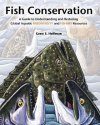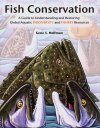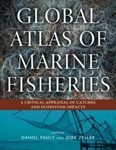![Fish Conservation Fish Conservation]()
Click to have a closer look
About this book
Contents
Biography
Related titles
About this book
&i;Fish Conservation&o; offers, for the first time in a single volume, a readable reference with a global approach to marine and freshwater fish diversity and fishery resource issues. Gene Helfman brings together available knowledge on the decline and restoration of freshwater and marine fishes, providing ecologically sound answers to biodiversity declines as well as to fishery management problems at the subsistence, recreational, and commercial levels.
This book considers the value of preserving aquatic biodiversity; offers an overview of imperiled fishes on a taxonomic and geographic basis; presents a synthesis of common characteristics of imperiled fishes and their habitats; details anthropogenic causes of decline; examines human exploitation issues; and addresses ethical questions surrounding exploitation of fishes.
The final chapter integrates topics and evaluates prospects for arresting declines, emphasizing the application of evolutionary and ecological principles in light of projected trends. Throughout, Helfman provides examples, explores case studies, and synthesizes available information from a broad taxonomic, habitat, and geographic range.
&i;Fish Conservation&o; summarizes the current state of knowledge about the degradation and restoration of diversity among fishes and the productivity of fishery resources, pointing out areas where progress has been made and where more needs to be done. Solutions focus on the application of ecological knowledge to solving practical problems, recognizing that effective biodiversity conservation depends on meeting human needs through management that focuses on long-term sustainability and an ecosystem perspective.
Contents
Table of Contents:
Preface
Part I: Introduction
Chapter 1. Fish Biodiversity and Why It Should Matter
Part II: Imperiled Fishes: Taxonomy, Geography, and Vulnerability
Chapter 2. Roll Call I: A Taxonomic Perspective
Chapter 3. Roll Call II: A Geopolitical Perspective
Chapter 4. Characteristics of Vulnerable Species and Correlates of Imperilment
Part III: Indirect Causes of Decline: Habitat, Water, and Introductions
Chapter 5. Habitat Modification and Loss
Chapter 6. Dams, Impoundments, and Other Hydrological Alterations
Chapter 7. Degraded Water Quality
Chapter 8. Alien Species I: Case Histories, Mechanisms, and Levels of Impact
Chapter 9. Alien Species II: Understanding the Process, Minimizing the Impact
Part IV: Direct Causes of Decline: Fishes as Commodities
Chapter 10. Fishes Versus Fisheries I: Overfishing
Chapter 11. Fishes Versus Fisheries II: Behavior, Life History Evolution, and Ecosystems
Chapter 12. Coral Reefs, Fishes, and Fisheries: Exploitation in Fragile Ecosystems
Chapter 13. The Trade in Live Fishes
Chapter 14. The Promise of Aquaculture and Hatcheries
Part V: Asking Hard Questions, Sorting Out Answers
Chapter 15. The Ethics of Exploitation and Intervention: Do We Have the Right?
Chapter 16. Future Perspectives: Beyond Gloom and Doom?
Appendix I: Probable fish extinctions
Glossary
References
Subject Index
Customer Reviews
Biography
Gene S. Helfman is emeritus professor in the Institute of Ecology and the program in conservation ecology and sustainable development at the University of Georgia in Athens.






















![Atlas des Poissons d'Eau Douce de Guyane, Tome 1 [Atlas of the Freshwater Fish of Guyana, Volume 1]](http://mediacdn.nhbs.com/jackets/jackets_resizer_medium/60/60402.jpg?height=150&width=99)













